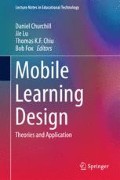Abstract
In this chapter, we explore a developing model for scaffolding and supporting professional development for higher education lecturers via mobile social media. The framework involves the establishment of communities of practice comprised of lecturers and mobile learning researchers exploring the potential of mobile social media to enable new pedagogical strategies. We identify three key elements of the framework illustrated by two case studies: modelling a community of practice, redefining pedagogy and designing an appropriate technology support infrastructure.
Access this chapter
Tax calculation will be finalised at checkout
Purchases are for personal use only
References
Anderson, T., & McGreal, R. (2012). Disruptive pedagogies and technologies in universities. Educational Technology & Society, 15(4), 380–389.
Attewell, J., Savill-Smith, C., Douch, R., & Parker, G. (2010). Modernising education and training: Mobilising technology for learning. Retrieved from http://www.talpalink.co.uk/resources/Modernising+education+and+training$2C+mobilising+technology+for+learning.pdf.
Boyer, E. (1990). Scholarship reconsidered: priorities of the professoriate. Princeton: Carnegie Foundation for the Advancement of Teaching.
Chi, M., & Hausmann, R. (2003). Do radical discoveries require ontological shifts? In L. Shavinina & R. Sternberg (Eds.), International handbook on innovation (Vol. 3, pp. 430–444). New York: Elsevier Science Ltd.
Cochrane, T., & Bateman, R. (2013). A mobile web 2.0 framework: Reconceptualizing teaching and learning. In M. Repetto, & G. Trentin (Eds.), Using network and mobile technology to bridge formal and informal learning (10th ed.) (pp. 57–92). Oxford: Chandos Publishing.
Cochrane, T., & Narayan, V. (2013). Redesigning professional development: reconceptualising teaching using social learning technologies. Research in Learning Technology, 21, 1–19.
Cochrane, T., & Withell, A. (2013, December 1–4). Do 21st Century students dream of electric sheep? A mobile social media framework for creative pedagogies. Paper presented at the Electric Dreams: Proceedings 30th Ascilite Conference, Macquarie University, Sydney, Australia.
Cochrane, T., Munn, J., & Antonczak, L. (2013, November 20–22). Design thinking for mlearning: Herding a flock of MOAs. Paper presented at the 3rd Mobile Creativity and Innovation Symposium, AUT University, Auckland, New Zealand.
Garnett, F., & Ecclesfield, N. (2011). Towards a framework for co-creating Open Scholarship. In D. Hawkridge, K. Ng & S. Verjans (Eds.), Proceedings of ALT-C 2011—Thriving in a Colder and more Challenging Climate: The 18th International Conference of the Association for Learning Technology (pp. 199–216). University of Leeds, UK: ALT Association for Learning Technology.
Greenhow, C., & Gleason, B. (2014). Social scholarship: Reconsidering scholarly practices in the age of social media. British Journal of Educational Technology, 45(3), 392–402.
Gunn, C., & Steel, C. (2012). Linking theory to practice in learning technology research. Research in Learning Technology, 20(2012), 1–14.
Hawksey, M. (2011). Twitter: How to archive event hashtags and create an interactive visualization of the conversation. Retrieved from http://mashe.hawksey.info/2011/11/twitter-how-to-archive-event-hashtags-and-visualize-conversation/.
Herrington, J., Herrington, A., Mantei, J., Olney, I., & Ferry, B. (Eds.). (2009). New technologies, new pedagogies: Mobile learning in higher education. Wollongong: Faculty of Education, University of Wollongong.
Herrington, J., Reeves, T., & Oliver, R. (2005). Online learning as information delivery: Digital myopia. Journal of Interactive Learning Research, 16(4), 353–367.
International Telecommunication Union. (2014, April). The World in 2014: ICT facts and figures. Retrieved from http://www.itu.int/en/ITU-D/Statistics/Documents/facts/ICTFactsFigures2014-e.pdf.
Lave, J., & Wenger, E. (1991). Situated learning: Legitimate peripheral participation. Cambridge: Cambridge University Press.
Luckin, R., Clark, W., Garnett, F., Whitworth, A., Akass, J., Cook, J., et al. (2010). Learner-generated contexts: A framework to support the effective use of technology for learning. In M. Lee & C. McLoughlin (Eds.), Web 2.0-Based E-Learning: Applying social informatics for tertiary teaching (pp. 70–84). Hershey, PA: IGI Global.
Puentedura, R. (2006). Transformation, Technology, and Education. Retrieved February 18, 2013, from http://hippasus.com/resources/tte/puentedura_tte.pdf.
Sharples, M. (2001). Disruptive devices: mobile technology for conversational learning. International Journal of Continuing Education and Lifelong Learning, 12(5/6), 504–520.
Sternberg, R. J., Kaufman, J. C., & Pretz, J. E. (2002). The creativity conundrum: A propulsion model of kinds of creative contributions. Philadelphia: Psychology Press.
UNESCO. (2013). UNESCO Policy guidelines for mobile learning (No. 978-92-3-001143-7). Paris, France: United Nations Educational Scientific and Cultural Organization.
Unterfrauner, E., & Marschalek, I. (2010). Appropriation of an online mobile community by marginalised young people: experiences from an Austrian case study. In M. Montebello, V. Camilleri & A. Dingli (Eds.), Proceedings of MLearn 2010: The 9th International conference on mobile learning (pp. 276–281). Valletta, Malta: University of Malta.
Wenger, E. (1998). Communities of practice: Learning, meaning, and identity. Cambridge: Cambridge University Press.
Wenger, E., McDermott, R., & Snyder, W. (2002). Cultivating communities of practice: A guide to managing knowledge. Boston: Harvard Business School Press.
Wenger, E., White, N., & Smith, J. (2009). Digital Habitats: Stewarding technology for communities. Portland, Oregon: CPsquare.
Wenger, E., White, N., Smith, J., & Rowe, K. (2005). Technology for Communities. In L. Langelier (Ed.), Working, learning and collaborating in a network: Guide to the implementation and leadership of intentional communities of practice (pp. 71–94). Quebec City: CEFIRO.
Author information
Authors and Affiliations
Corresponding author
Editor information
Editors and Affiliations
Rights and permissions
Copyright information
© 2016 Springer Science+Business Media Singapore
About this chapter
Cite this chapter
Cochrane, T., Narayan, V. (2016). Mobile Social Media: Redefining Professional Development and Collaborative Scholarship. In: Churchill, D., Lu, J., Chiu, T., Fox, B. (eds) Mobile Learning Design. Lecture Notes in Educational Technology. Springer, Singapore. https://doi.org/10.1007/978-981-10-0027-0_3
Download citation
DOI: https://doi.org/10.1007/978-981-10-0027-0_3
Published:
Publisher Name: Springer, Singapore
Print ISBN: 978-981-10-0025-6
Online ISBN: 978-981-10-0027-0
eBook Packages: EducationEducation (R0)

